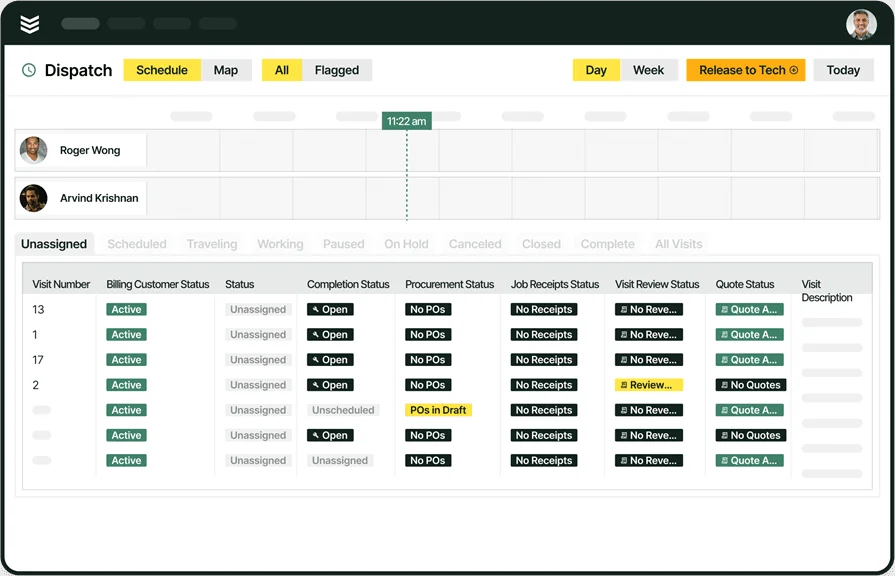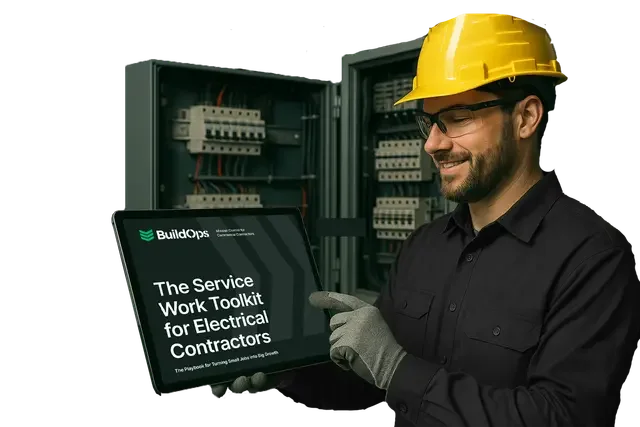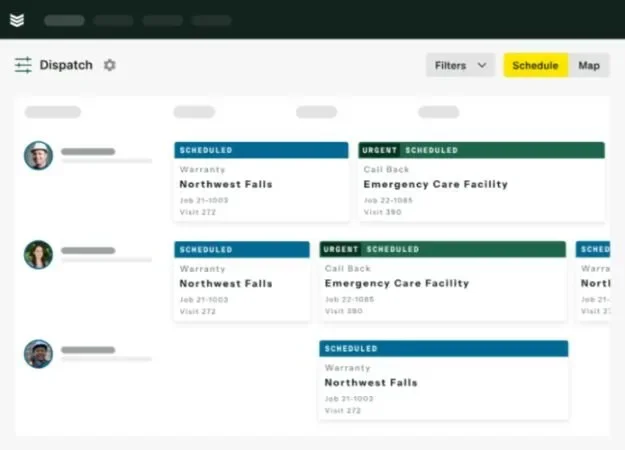Managing an electrical contracting business comes with enough challenges—scheduling your crew shouldn’t be one of them. Whether you’re juggling last-minute jobs, coordinating multiple teams across different sites, or trying to reduce downtime between appointments, an electrical contractor scheduling app can make all the difference. The right tool keeps your technicians organized, eliminates miscommunication, and ensures every job gets assigned, tracked, and completed on time.
But not all scheduling apps are built for electrical service professionals. You need software that understands the unique demands of the electrical industry—service calls, emergency jobs, and complex job tracking. In this guide, we’ll break down everything you need to know, including:
- How to choose the right scheduling app for your electrical technicians
- 5 key features to look for in an electrical contractor scheduling app
- Best for commercial contractors
- Best for residential contractors
- Best for general contractors
- Other notable electrical contractor scheduling apps
- 7 benefits of using a scheduling app as an electrical contractor
- 4 important electrical contractor scheduling app FAQs answered
Electrical contractors need a tool that fits how they work—whether that’s managing dispatch for a growing team or ensuring emergency calls get prioritized. Let’s take a closer look at what really matters when selecting a scheduling app for your electrical business.
How to choose the right scheduling app for your electrical technicians
Keeping your electrical crew on track is about making sure the right tech is at the right site, fully equipped, and ready to work. A solid scheduling app helps you manage last-minute callouts, emergency jobs, and complex service routes without scrambling. But how do you pick the right one?
Not all scheduling apps are built for electrical contractors. You need software that understands how your business operates—whether that’s managing service calls, handling multi-day projects, or keeping track of technician certifications. The goal is to reduce scheduling headaches and keep jobs moving smoothly. That’s why having the right field service scheduling system is critical—it ensures seamless coordination between office staff and technicians while minimizing downtime.
Before you commit to a scheduling app, ask yourself these key questions:
- Workload management – Can the app balance technician workloads and prevent overbooking? How does it handle shift changes and unexpected delays?
- Dispatching efficiency – Does it offer real-time updates and route optimization? Can you assign jobs on the fly?
- Scalability – Will this app grow with your business? Can it support multiple job sites, crews, and service types?
- Integration with other tools – Does it sync with your invoicing, inventory, or CRM system? How easily does it fit into your current workflow?
- Key features – What essential scheduling tools does it include? Are there automation options to reduce manual admin work?
At the core of any good scheduling app are the features that make daily operations smoother. From real-time tracking to automated job assignments, let’s break down the five must-have features electrical contractors should look for.
5 key features to look for in an electrical contractor scheduling app
Every electrical contractor knows the headache of managing schedules manually. Jobs get delayed, dispatchers struggle to keep track of technicians, and last-minute changes cause chaos.
Suppose a commercial job site loses power, and your team scrambles to reroute a technician, only to find out he’s already booked on another emergency call. Without a scheduling app designed for electrical businesses, you’re left juggling phone calls, spreadsheets, and unnecessary stress. The right scheduling app does more than just assign jobs—it keeps your entire operation running smoothly. From dispatching and invoicing to tracking job progress in real time, these five essential features help electrical contractors eliminate inefficiencies and stay ahead.
1. Real-time dispatching & job scheduling
Coordinating multiple service calls, emergency jobs, and planned maintenance tasks requires a system that adapts in real-time. A scheduling app with real-time dispatching ensures technicians receive instant updates on job assignments, route changes, and priority calls. No more back-and-forth phone calls—your team stays connected and efficient. Imagine an industrial facility reporting a critical equipment failure. You need to send the nearest available tech with the right skills and gear. With an electrical dispatching software, you can instantly assign the job based on location, workload, and skill set—getting the right technician on-site faster.

Explore our scheduling tool
Schedule more projects and effectively dispatch techs for faster job completion.
2. Mobile access for technicians
Field techs don’t have time to stop and check emails or call the office every time a new job comes in. A mobile-friendly scheduling app lets them view assignments, update job statuses, and communicate with dispatch in real-time. Put yourself in this situation: you’re an electrician installing a panel upgrade at a commercial site when a client requests an additional circuit run. Instead of calling the office for approval, the tech can check job details, log the new request, and confirm the update instantly using an electrical contractor mobile app.
3. Integrated invoicing & payments
A scheduling app should do more than just manage job assignments—it should streamline billing, too. Integrated invoicing and payment processing allows electrical contractors to generate invoices, track payments, and reduce delays. For example, after completing a service call at a retail location, your technician finalizes the job and submits the details through the app. With an electrical contractor invoicing tool, the office can instantly generate an invoice, send it to the client, and even process payment on the spot.
4. GPS fleet tracking
Electrical contractors rely on service vehicles to get techs to job sites efficiently. A fleet tracking feature within your scheduling app helps monitor vehicle locations, optimize routes, and reduce fuel costs. Say your dispatcher needs to send a technician to an urgent job across town. Instead of blindly assigning the next available tech, they check the app’s electrical fleet tracking system to locate the closest vehicle—cutting travel time and getting the job done faster.
5. Automated job reporting & performance tracking
Keeping track of job progress, technician performance, and completed work orders is critical for electrical contractors. A reporting feature in your scheduling app provides real-time insights into job completion times, labor hours, and revenue. Take a large-scale commercial wiring project—multiple electricians are assigned, and each phase needs tracking. Using an electrical contractor reporting system, managers can pull real-time data on job progress, technician hours, and material usage, ensuring deadlines and budgets stay on track.
A well-designed scheduling app isn’t just a tool—it’s a game-changer for electrical contractors. With these five key features, you can minimize scheduling chaos, improve efficiency, and keep your operation running at full capacity.
Other notable features for electrical contractor scheduling apps
Beyond core scheduling and dispatching, a well-rounded scheduling app should include additional features that make daily operations smoother. These extra tools help electrical contractors manage jobs efficiently, reduce paperwork, and improve team coordination. Whether it’s streamlining client relationships, automating recurring work, or tracking billable hours, these added capabilities can be game-changers.
- CRM for electrical contractors – Keeping track of client history, job details, and communication records is essential for electrical businesses. A customer relationship management (CRM) system built into a scheduling app ensures all client interactions and job notes are stored in one place. Instead of scrambling to find past service details, office staff and field techs can pull up complete job histories instantly. With an electrical contractor CRM, businesses can maintain strong client relationships and avoid costly miscommunications.
- Service agreements & contract management – Electrical contractors often rely on recurring maintenance contracts to keep revenue steady. A scheduling app with service agreement management ensures contract details, renewal dates, and recurring jobs are tracked automatically. Think, for example, a property management company that requires scheduled electrical inspections across multiple locations—without proper tracking, a job could easily be missed. Using an electrical service agreement tool helps contractors automate recurring work and maintain long-term client commitments without manual follow-ups.
- Time tracking & payroll integration – Managing labor hours manually is a hassle, especially when tracking billable vs. non-billable time for different projects. A time tracking feature within the scheduling app allows electrical contractors to monitor work hours, reduce payroll errors, and improve job costing accuracy. Imagine a technician handling an after-hours emergency call—without a proper system, overtime pay calculations could get messy. By using an electrical time tracking system, contractors can log hours accurately and ensure fair compensation while keeping payroll streamlined.
These additional features help electrical contractors improve workflow efficiency, reduce administrative burdens, and keep their teams on schedule. With the right tools in place, managing an electrical service business becomes a whole lot easier.
Best for commercial contractors: BuildOps
BuildOps is purpose-built for commercial electrical contractors, offering robust scheduling, dispatching, and workforce management in a single platform. Unlike general field service apps, it’s designed for multi-day projects, complex job tracking, and large-scale operations.
App Type: Cloud-based, all-in-one field service management software
How Pricing Works: We provide weekly live demos and the opportunity to schedule a customized session where we help you explore features and select the best option for the needs of your small business.
Features Beyond Scheduling: Includes advanced job costing, project tracking, customer management, and integrations with accounting software.
What Sets it Apart for Commercial: BuildOps stands out with real-time scheduling, technician tracking, and automated workflows built specifically for commercial electrical contractors. It streamlines operations from job assignment to invoicing, ensuring large-scale projects stay on track.

Improve day-to-day operations
We help commercial electrical contractors stay on schedule and maximize efficiency.
Best for residential contractors: Housecall Pro
Image Source: Housecall Pro
Housecall Pro is a solid choice for residential electrical contractors handling quick service calls and homeowner requests. It offers job scheduling, invoicing, and customer communication tools in a user-friendly interface. However, it lacks some of the in-depth project management features needed for commercial work.
App Type: Cloud-based, mobile-first field service management
How Pricing Works: Monthly subscription that starts from $59 to $149+, depending on features and number of users in your organization.
Features Beyond Scheduling: Includes automated customer reminders, payment processing, and marketing tools.
What Sets it Apart for Residential: Housecall Pro is great for electricians focused on small jobs and service calls. Its automated appointment reminders and easy invoicing help streamline operations for residential contractors.
Deep Dive
Want to see exactly how BuildOps and Housecall Pro stack up against each other? Check out our head-to-head feature comparison of both tools right here to see which one is the better fit for your electrical business.
Best for general contractors: Jobber
Image Source: Jobber
Jobber is a flexible scheduling and job management tool suited for electrical contractors who handle both residential and light commercial work. While it offers strong scheduling and invoicing features, it may lack the deeper customization and project tracking capabilities needed for larger-scale electrical projects.
App Type: Cloud-based field service management software
How Pricing Works: Monthly plans range from $29 to $149, scaled by the sets of features needed and the number of users.
Features Beyond Scheduling: Includes job estimates, invoicing, CRM, and automated follow-ups.
What Sets it Apart for General Contractors: Jobber is ideal for electrical contractors who need a simple, easy-to-use scheduling tool with built-in client management and invoicing. However, for contractors handling more complex commercial jobs, more advanced project tracking tools may be required.
Other notable electrical contractor scheduling apps
Not every scheduling app is built for electrical contractors, but there are several options that may work depending on your business needs. Some tools prioritize residential service calls, while others focus on general job management. While they may not offer the same depth of commercial-focused features as BuildOps, they still provide useful scheduling and workflow management capabilities for electricians and electrical service companies.
Here’s a look at some other notable options.
Service Fusion: for electrical contractors handling residential and light commercial work
Image Source: Service Fusion
Service Fusion is designed for electrical contractors who need a straightforward, easy-to-use scheduling tool. It allows dispatchers to assign jobs, track technicians, and generate invoices from a single platform. However, it may lack the advanced project tracking capabilities needed for larger-scale commercial jobs.
App Type: Cloud-based field service management software
How Pricing Works: Starts at around $192/month with additional costs for integrations and advanced features.
Features Beyond Scheduling: Includes invoicing, estimates, GPS tracking, and customer communication tools.
What Sets it Apart for Electrical Contractors: Service Fusion works well for contractors managing smaller teams and service-based work. However, for those handling multi-day projects and larger crews, more advanced scheduling solutions may be necessary.
FieldEdge: for electrical businesses that prioritize customer management
Image Source: FieldEdge
FieldEdge is a scheduling and job management tool that emphasizes customer relationship management (CRM). It’s useful for electrical contractors who need detailed client history, service records, and recurring job tracking. However, it may not be ideal for commercial contractors requiring robust project management features.
App Type: Cloud-based field service software
How Pricing Works: Pricing is custom-based on company size and features.
Features Beyond Scheduling: Includes CRM, invoicing, technician tracking, and sales tools.
What Sets it Apart for Electrical Contractors: FieldEdge helps electricians manage long-term customer relationships and track service history. While great for residential contractors, it may not offer the project-level tracking needed for large commercial jobs.
Joblogic: for electrical contractors focused on maintenance contracts
Image Source: Joblogic
Joblogic is a solid choice for electrical contractors managing recurring service agreements and maintenance contracts. It offers automated scheduling for routine inspections and asset management features that help track equipment servicing. However, it may not have the advanced dispatching capabilities needed for high-volume emergency jobs.
App Type: Cloud-based job management software
How Pricing Works: Monthly pricing starts at $47 per user.
Features Beyond Scheduling: Includes preventative maintenance tracking, job costing, and compliance management.
What Sets it Apart for Electrical Contractors: Joblogic works well for contractors handling long-term maintenance contracts and recurring service calls. While it excels at managing scheduled work, those needing a more dynamic dispatching system for urgent jobs may require additional functionality.

Compare electrical scheduling apps
Easily compare software with an easy-to-use scoresheet and questions to ask providers.
7 benefits of using a scheduling app as an electrical contractor
Scheduling is one of the biggest challenges electrical contractors face. Between emergency calls, long-term projects, and last-minute changes, keeping technicians organized can feel impossible without the right tools. Think of a service technician heading to a scheduled panel upgrade, only to be rerouted to an urgent power outage. Without a proper system, job details get lost, response times suffer, and customer frustration builds.
A scheduling app built for electrical contractors eliminates these challenges by keeping jobs organized, technicians informed, and dispatchers in control. Here are seven major benefits of using one.
1. Faster response times for emergency jobs
Electrical contractors often handle time-sensitive jobs that require immediate attention. A scheduling app with real-time dispatching allows teams to assign urgent tasks to the nearest available technician without delay.
Take an industrial site that suddenly loses power. Instead of calling around to check technician availability, a dispatcher can instantly locate the closest crew and reroute them using an electrical contractor dispatch software, ensuring minimal downtime for the client.
2. Reduced scheduling conflicts and double bookings
Manual scheduling leads to overlapping jobs and wasted trips. A scheduling app with automated job assignment prevents double bookings by ensuring each technician is only assigned to one task at a time. For instance, an electrical contractor juggling multiple commercial service contracts can avoid costly errors by using an electrical contractor scheduling app that syncs all job assignments in real time, keeping technicians on track and preventing mix-ups.
3. Better project management and job tracking
Electrical jobs often span multiple days or even weeks. A scheduling app with project management tools allows contractors to track job progress, update schedules, and ensure every phase runs smoothly. Imagine a commercial office building undergoing a complete rewiring project. With a project management software built for electrical contractors, managers can track milestones, assign tasks, and adjust schedules as needed, ensuring the project stays on deadline.
4. Improved customer communication and satisfaction
Clients expect clear communication about arrival times, job status, and estimated completion. A scheduling app with customer management tools ensures that updates are automatically sent, reducing uncertainty. Consider a property manager overseeing multiple residential buildings. Instead of calling for status updates, they receive real-time notifications from a CRM system, keeping them informed about technician arrivals and work completion.
Deep Dive
To learn more about this, check out this guide to the top CRM software for electrical contractors.
5. More efficient field-to-office coordination
Without a centralized system, office staff and field technicians struggle to stay on the same page. A scheduling app with field service integration connects technicians and dispatchers, ensuring seamless communication.
For example, an electrician completing a service upgrade at a retail store can instantly update job status, request parts, or upload photos using an electrical field service software, keeping office staff informed without extra phone calls.
6. Optimized workforce utilization and reduced downtime
Idle technicians cost money, while overbooked teams lead to burnout. A scheduling app helps electrical contractors balance workloads by assigning jobs based on skill set, location, and availability.
Picture a growing electrical company managing installations across multiple sites. Using an electrical contractor scheduling software, they can ensure that each technician has a full but manageable schedule, improving efficiency without overwhelming the team.
7. Increased profitability through better job planning
Wasted trips, rescheduled jobs, and lost invoices eat into profits. A scheduling app helps streamline operations by improving job planning, tracking billable hours, and ensuring faster invoicing.
Take a service contractor handling monthly electrical maintenance contracts. By integrating scheduling with job tracking in an electrical field service software, they can ensure every job is logged, billed, and completed efficiently—maximizing revenue without extra admin work.

Streamline your electrical services
Access real-life examples and templates that help you develop straightforward processes.
4 important electrical contractor scheduling app FAQs answered
Managing schedules, dispatching technicians, and keeping projects on track can be overwhelming without the right tools. Electrical contractors often ask what a scheduling app can do, how it works, and whether it’s the right fit for their business. Below are the most common questions answered.
1. What is an electrical contractor scheduling app?
Electrical contractor scheduling apps assign jobs, manage technician availability, and track work progress in real time. It reduces scheduling conflicts, automates dispatching, and improves field-office communication. Also included are invoicing, GPS tracking, and reporting to improve efficiency.
2. How do electrical contractor scheduling apps work?
These apps centralize job scheduling by allowing dispatchers to assign work based on technician availability, location, and skill set. Technicians receive real-time updates via mobile, track job progress, and update status on-site. Integrated invoicing, reporting, and CRM tools further streamline workflow by keeping everything connected in one system.
3. What types of businesses benefit from an electrical contractor scheduling app?
Electrical contractors of all sizes benefit, from small residential service businesses to large commercial firms. Companies handling emergency repairs, scheduled maintenance, or multi-day installations gain the most, as the app ensures efficient dispatching, better project tracking, and improved customer communication.
4. What are some best practices electrical contractors should follow when using a scheduling app?
- Automate job assignments – Reduce manual work by setting rules for technician dispatching based on location and expertise.
- Sync with other systems – Integrate scheduling with invoicing, CRM, and inventory for seamless workflow management.
- Optimize technician routes – Use GPS tracking to minimize travel time and fuel costs.
- Regularly update job statuses – Ensure real-time communication between the office and field.
- Review analytics – Use reporting features to identify scheduling bottlenecks and improve efficiency.
- Set up customer notifications – Keep clients informed with automated appointment reminders, ETA updates, and job completion alerts.
- Use mobile access for technicians – Ensure field techs can update job progress, upload photos, and access work orders from anywhere.
- Standardize scheduling procedures – Create a structured scheduling process to ensure consistency and reduce last-minute disruptions.
A reliable scheduling app is essential for electrical contractors looking to stay organized, improve response times, and maximize efficiency. The right tool keeps jobs on track, reduces scheduling headaches, and ensures seamless communication between office staff and field technicians. But not all scheduling apps offer the same level of functionality—some lack real-time dispatching, others don’t integrate with invoicing or project tracking, leaving contractors juggling multiple systems.
That’s where all-in-one solutions like BuildOps make the difference. For commercial electrical contractors managing complex jobs, a platform that combines scheduling, dispatching, reporting, and invoicing into one streamlined system is key. Instead of piecing together different tools, a unified solution ensures everything runs smoothly from the first work order to the final payment.

Curious to see it in action?
Explore how BuildOps simplifies scheduling for electrical contractors.







